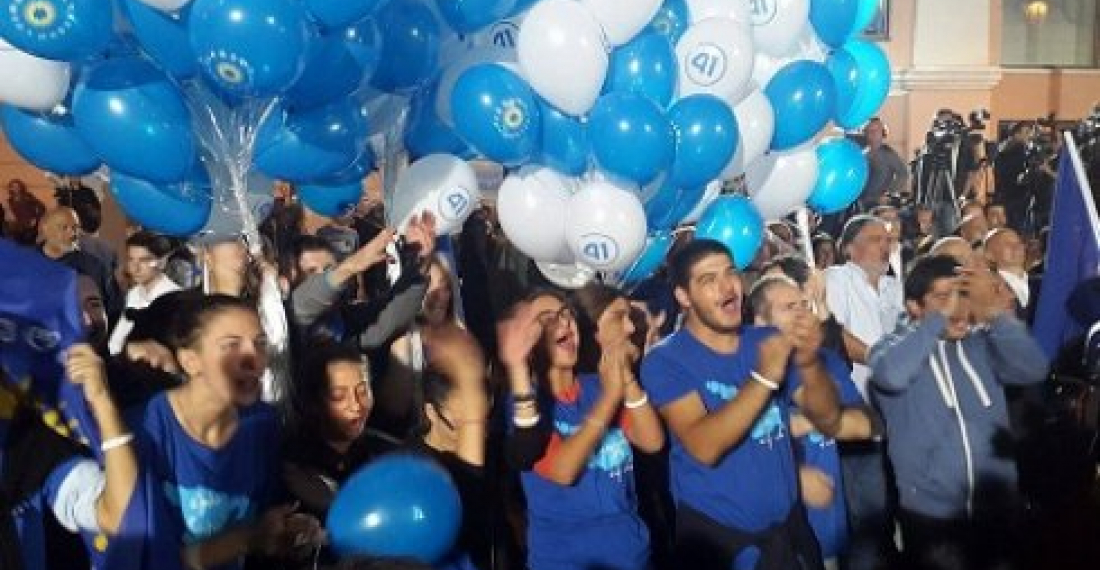This is a commentary prepared by the political editor of commonspace.eu
The results of the last round of the parliamentary elections in Georgia have confirmed a landslide victory for the ruling Georgian Dream party (GD) which now has a renewed and increased mandate to push forward its political vision. Having won 115 seats, it now not only has a huge majority in parliament but also enough to amend the constitution, if it so wishes, without the support of other parties.
Today, Georgia embarks on a new political journey. The period of democratic transition is over, and a new phase, where the emphasis must be on state and democratic consolidation, has opened. The October 2016 Parliamentary elections in Georgia were not perfect, but they were the best the country ever had, and within the accepted international standards. Well organised, competitive and fair elections now need to become a habit, so that politicians and voters alike can focus on policies and substance.
Whilst in this election the government has not changed, politics has. The dynamic inside the newly elected, 150-member, Georgian parliament will be very different - with only three parties represented, and with a much smaller opposition. This will be made up of the United National Movement (UNM) with 27 seats and the Patriots Alliance (PA)with 6 seats. 2 MPs will sit as independents but are likely to support the government on most issues. A healthy democracy depends on an effective and constructive parliamentary opposition which is essential to provide the checks and balances necessary. The Georgian Dream government, with its new huge majority, will be well advised to be magnanimous in victory, especially when it comes to allocation of key posts for parliamentary scrutiny of areas such as budgetary control.
A huge responsibility is on the shoulders of Georgian Dream and its leaders. The Party now holds all the leverages of power. It has been given the trust of the Georgian people, and it must now deliver, especially on the economy, and the improvement of the quality of life of the average Georgian. The Party needs to strengthen the mechanism of internal debate and the way it interphases with the rest of society. There are big and tough decisions ahead, and they need to be taken in broad consultation with both the party membership and the rest of society
Within the other political parties, both those that are represented in parliament, and those that are not, a massive rethink has now started. Already some key personalities have announced their plans: the outgoing Chairman of Parliament, David Usupashvili has led an exodus from the Republican Party, but says he will remain on frontline politics; Irakli Alasania and some of his close associates have left the Free Democrats and are taking time out of politics; as is UNM's Mikheil Machavariani.
A new re-alignment amongst the opposition parties is now not only possible but likely. Much will depend on the future of the UNM, and its ability to modernise itself and adapt to the new challenges ahead. Many Georgian politicians and political forces refuse to have anything to do with it until it does so. The Patriots are a new force. We will soon know if the accusations hurled at them that they are a xenophobic, pro-Russian party - which they strenuously deny - are true or not. They can be a disruptive force, but given the size of the government majority this should not be the case
There is also talk of a new political force with centrist and liberal values and this is likely to emerge. On the fringes, some of the last dinosaurs of Georgian politics, such as Nino Burjanadze and Shalva Natelashvili, pledge to struggle on, but their moment has passed.
The new situation also offers a challenge and an opportunity for the political elites in Europe to engage anew with Georgian politics, and contribute to its future development. The big political families of Europe - the European People's Party, the Socialists and Democrats, the Liberals, and others have affiliates in Georgia. They need to up their game, and offer not simply solidarity but also political mentoring to their Georgian partners. The new Georgian Parliament is overwhelmingly pro-western and pro-European. The process of embedding European values within the Georgian political culture is however far from complete. The journey ahead for Georgian politics is bound to be eventful, but the ingredients are there for the breakthrough that Georgia needs, and that its' politicians have promised. Europe should be there, accompanying Georgia on this journey.
source: this commentary was prepared by the political editor of commonspace.eu
photo: Georgian Dream supporters celebrating after the 2016 parliamentary elections (picture courtesy of agenda.ge)







